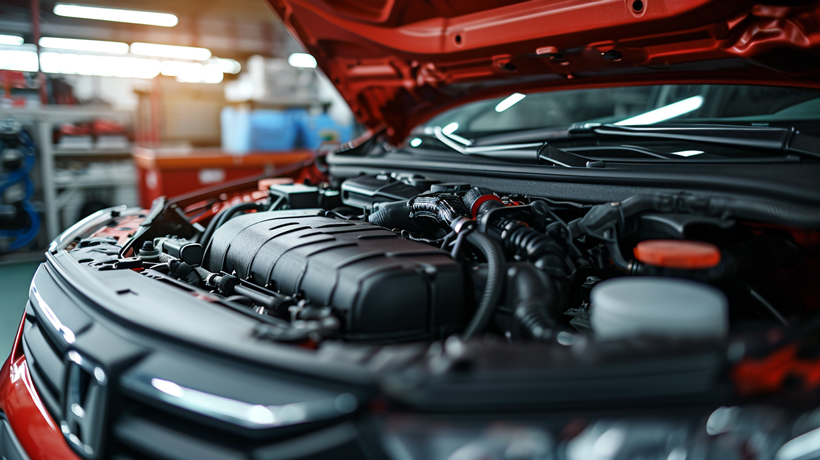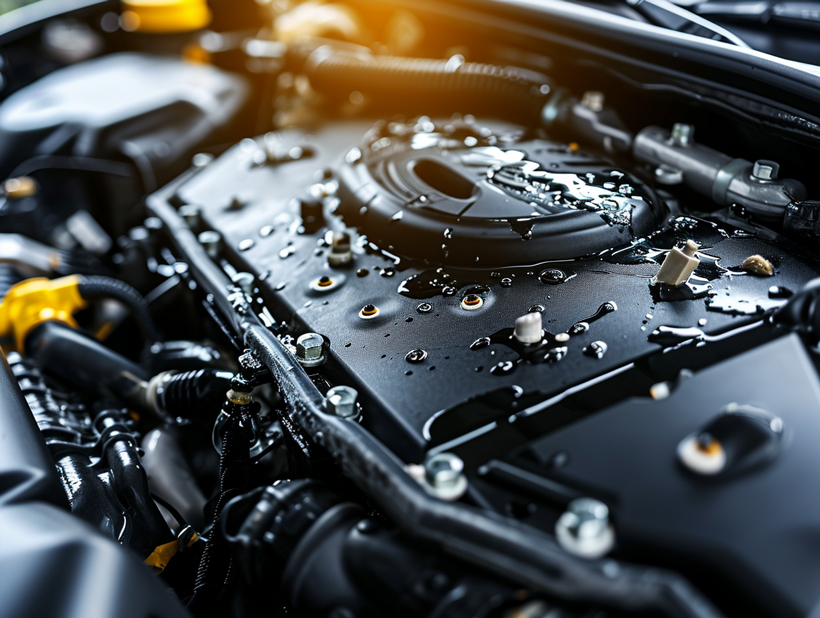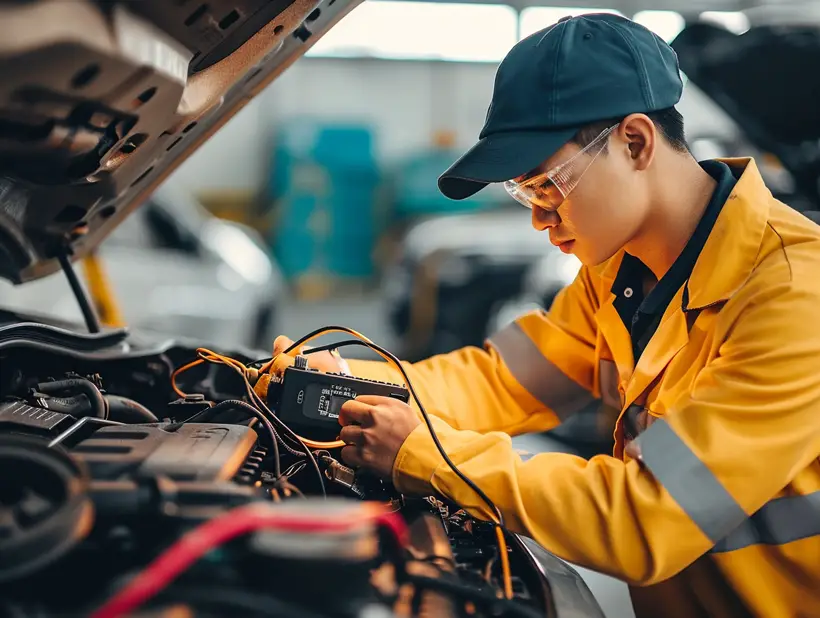We’ve all been there‚ sitting in the driver’s seat when suddenly, an unsettling knocking noise emerges from under the hood. It’s not just annoying; it’s a cry for help from your engine. But fear not, we’re here to demystify those pesky engine knocks and guide you through the fixes that’ll bring back the sweet sound of silence.
Understanding what causes engine knock is key to preventing long-term damage. Whether it’s due to poor fuel quality, incorrect ignition timing, or worn-out components, we’ve got the lowdown on identifying the culprits. Stick with us, and we’ll show you how to diagnose and address these issues, ensuring your ride runs smoothly and quietly once again.
What is Engine Knock?
Understanding engine knock is crucial to maintaining the health of your vehicle. Commonly referred to as “pinging” or “detonation,” this issue arises when the air-fuel mixture in the engine’s cylinders isn’t burning evenly. Let’s take a deeper dive into this phenomenon.
Engine knocks can often be heard as a rapid rattling, typically when accelerating or under a load. It’s a warning sign that internal components could be suffering. These noises originate from the pressure waves generated by the uneven combustion, which causes the cylinder walls and piston to vibrate intensely.

Several factors can lead to this uneven burning:
- Low-Quality Fuel: Fuel with insufficient octane fails to resist engine knock.
- Overheating: Higher engine temperatures increase the likelihood of fuel pre-igniting.
- Ignition Timing: If the spark plug ignites the fuel-air mixture too early it can result in knock.
- Carbon Deposits: Build-up in the combustion chamber can raise compression levels, causing knock.
When we talk about the severity, engine knock ranges from being a simple annoyance to a harbinger of major disruption. It’s not something you should ignore. Early intervention can spare you from costly repairs and prolong the lifespan of your car.
To diagnose engine knock, we’ll typically employ a combination of advanced scanning tools and a nuanced ear, trained to distinguish irregular combustion sounds from the normal hum of the engine. Moreover, regular maintenance checks can preempt the conditions that predispose your engine to knock.
We’ll next explore the actionable steps you can take to remedy engine knock. Remember, it’s not just about quelling the noise‚Äîour goal is to restore and preserve the integrity of your engine’s performance.
Common Causes of Engine Knock
Engine knock is a common concern that can leave many car owners scratching their heads. We’re here to shed light on the frequent culprits behind this pesky problem.
Low-Quality Fuel: One of the primary causes of engine knock is using fuel with an octane rating too low for the vehicle’s requirements. Cars designed for high octane levels may experience knocking if the fuel doesn’t prevent combustion caused by the high pressures within the engine.
- Try using a higher-octane fuel, especially if you’re driving a performance vehicle.
Overheating: Engines run hot, and when they surpass their optimal operating temperatures, it can lead to knocking. An overheated engine can be due to a malfunctioning cooling system or external temperatures.
- Regularly check your coolant levels and cooling system performance.

Improper Ignition Timing: When the spark plugs fire at the wrong time, it can cause an uneven burn of the air-fuel mixture, leading to knocks.
- Ensuring timely maintenance and proper timing adjustments can help.
Carbon Deposits: Over time, carbon can build up in the combustion chamber, altering the volume and increasing the likelihood of knocking.
- Use fuel additives designed to clean the engine and reduce carbon accumulation.
Worn Spark Plugs: Old or dirty spark plugs can’t ignite the fuel effectively, resulting in incomplete combustion and knocking.
- Replace spark plugs according to your car’s maintenance schedule.
We understand the frustration that comes with engine knock issues. It’s why we’re dedicated to providing guidance that’s pragmatic and easy to follow. Our aim is to help you pinpoint the cause and find a viable solution, ensuring that your vehicle runs smoothly and efficiently.
Poor Fuel Quality
Driving a car should be smooth and enjoyable, but when we’re faced with the jarring interruption of engine knock, it’s a clear indicator that something isn’t right under the hood. Among the leading causes of this frustrating problem is poor fuel quality‚Äîan issue that can affect any vehicle and lead to long-term engine damage if not addressed promptly.
Fuel quality directly impacts an engine’s combustion process. Different cars require different octane ratings, and using fuel that doesn’t meet your vehicle’s specifications can lead to pre-ignition ‚Äì when the fuel combusts too early, causing a knocking noise. It’s this early detonation that wreaks havoc, robbing us of a smooth ride and potentially leading to costly repairs.

Here’s what we should look out for:
- Low Octane Fuel: If we fill up with a lower octane fuel than our vehicle requires, we may notice a knock, especially when accelerating.
- Contaminated Fuel: Gasoline contaminated with water or other substances damages engine performance and could be the culprit behind those knocking sounds.
To remedy the problem, we should follow these steps:
- Ensure we’re using the correct octane fuel. Check the owner’s manual for the recommended rating.
- If the issue persists after refueling with the right octane, try a fuel additive designed to clean the fuel injectors and remove contaminants.
Remember, fuel isn’t just about octane numbers. Different brands offer various additive packages, and some might be more effective at preventing knock. Regularly using a reputable brand that suits our car can make all the difference. If switching brands and using the proper fuel doesn’t solve the problem, it’s likely we’re dealing with another issue on the list of common knock causes, such as overheating or carbon deposits.
Incorrect Ignition Timing
When we delve into the intricacies of engine knock causes, incorrect ignition timing ranks high on the list. Our engines are designed to fire the spark plug at the precise moment necessary for optimum performance. When that timing is off, it can lead to an array of problems, one of which is the unwanted rattle of engine knock.
Improper ignition timing occurs when the spark plugs ignite the fuel-air mixture in the cylinders at the wrong time. This mistiming can cause the fuel to burn in an uncontrolled way, leading to the colliding of flame fronts ‚Äì or in simpler terms, the engine knock we’re eager to silence.
The factors that might lead to incorrect ignition timing include:
- Worn out timing belts or chains
- Faulty spark plugs or ignition coils
- Issues with the engine’s electronic control unit (ECU)
Addressing incorrect ignition timing requires a mix of inspection and intervention:
- Check and replace timing belts or chains as advised by your vehicle’s maintenance schedule.
- Spark plugs and ignition coils should be examined for wear and replaced if necessary.
- Diagnosing ECU problems often needs professional equipment, so it’s best to consult an experienced mechanic.
Modern vehicles typically have onboard computers that control ignition timing, making manual adjustments a thing of the past. Yet, these systems aren’t immune to hiccups. Sensor malfunctions or software glitches can lead to improper timing settings, demanding a keen diagnostic eye.
For those of us with older models or classic cars, understanding how to manually adjust ignition timing can be a useful skill. A stroboscopic timing light is the tool of choice here, illuminating timing marks on the flywheel or pulley to guide your adjustments.
A well-timed engine runs smoother, quieter, and more efficiently. Regular maintenance is key to ensuring the timing remains on point, safeguarding against the frustrating knock that can disrupt our otherwise pleasant drive.
Maintenance Tips to Prevent Incorrect Ignition Timing
Ensuring our vehicle stays in top condition not only prevents engine knock but can improve overall longevity and performance.
- Regularly scheduled tune-ups ensure components like spark plugs and timing belts are in good condition.
- Fuel system cleaning helps maintain clean and efficient combustion, which goes hand in hand with proper ignition timing.
- Software updates for the engine’s control system can resolve hidden
Worn-out Components
When exploring the reasons behind engine knock, it’s crucial to examine the condition of internal engine components. Over time, these parts can suffer from wear and tear, compromising the engine’s performance.
- Pistons and Piston Rings: If the pistons or their rings are worn, they may not seal the combustion chamber properly. This can lead to a loss of compression and the subsequent escape of unburnt fuel, which can detonate unexpectedly.
- Rod Bearings: Worn-out rod bearings decrease the stability of the connection between pistons and crankshaft. This can cause the pistons to move improperly, leading to irregular combustion and engine knock.
- Valves and Valve Train Components: Imperfections or wear in the valve train can result in imprecise opening and closing of valves, impacting the timing of fuel and air entering and exiting the combustion chamber.

To pinpoint the exact cause, we’d run a series of diagnostics. The complexity of these jobs often means that they’re best left to professionals.
Preventative Measures and Detection:
- Regular Oil Changes: Ensuring timely oil changes can prevent the premature wear of engine components.
- Using High-Quality Fuel: Fuel with the correct octane rating for your vehicle can reduce combustion issues.
- Listening for Changes: Stay alert to any unusual sounds from your engine which indicate a need for immediate attention.
Diagnosing Component Wear:
To effectively diagnose worn components, it’s vital to use advanced diagnostic tools. A comprehensive inspection might involve:
- Compression tests to assess the health of pistons and rings.
- Oil analysis to check for metal particles, an indicator of bearing wear.
- Visual inspection of valves and valve train components during engine disassembly.
In diagnosing these problems, replacing worn components often rectifies engine knock issues. It‚Äôs beneficial to use high-quality replacement parts that match the manufacturer’s specifications to ensure longevity and optimal performance. Regular engine check-ups should spot early signs of wear before they escalate into severe problems.
How to Diagnose Engine Knock
When it comes to pinpointing the root cause of engine knock, a systematic approach can save us time and ensure we’re addressing the correct issue. Here are steps we can follow to diagnose engine knock in our vehicle:
- Listen Carefully: Identify when the engine knock occurs. Is it constant or does it happen under specific conditions like acceleration or idling?
- Consult the Manual: Our car’s manual will have specifications for sounds that are normal and those that aren’t. This can guide our initial assessment.
- Use a Stethoscope: An automotive stethoscope can help us pinpoint the source of the knock. We should listen to the engine block, the cylinder head, and the valves.
Once we’ve gathered this preliminary information, we can move on to more detailed checks.
Check Engine Codes: Oftentimes, our vehicle’s onboard diagnostics system will store codes that can provide insight into what’s causing the knock. A code reader can reveal these, and they can guide us to specific components that might be the issue.
Here are some additional steps to include in our diagnosis:
- Inspect the Spark Plugs: Incorrect spark plug gaps or fouled plugs can lead to premature detonation and knocking.
- Evaluate Fuel Quality: Sometimes the knock can be caused by using fuel with an octane rating that’s too low for our engine.
- Perform a Compression Test: This can help us determine if there are issues with the engine’s compression that could be causing knocking sounds.
It’s important to remember that engine knock can be a symptom of various issues. Some potential causes could be more benign, while others may be indicative of significant internal engine wear. Keeping up with regular maintenance is crucial in preventing many of these causes from developing into bigger problems.
Finally, if we’ve conducted these checks and still haven’t isolated the cause, it might be time to seek professional assistance. Our trusted mechanic can use advanced diagnostic tools and their expertise to delve deeper into the engine’s operation and uncover the source of the knock.
Addressing Engine Knock
When we’re faced with the challenge of an engine knock, we know immediate action is necessary to prevent further damage. The first step in addressing this issue is to verify the type of knock we’re dealing with. We categorize engine knocks into two main types: detonation knock and mechanical knock. Detonation knock often arises from improper combustion, while mechanical knock is usually related to physical components clashing within the engine.

To deal with a detonation knock, we should:
- Ensure we’re using the correct octane-rated fuel as specified by the vehicle manufacturer
- Check and replace any failing ignition components
- Consider cleaning or replacing the engine’s knock sensor if it‚Äôs malfunctioning
On the other hand, dealing with a mechanical knock may involve:
- Inspecting and possibly replacing worn-out pistons and connecting rod bearings
- Reassessing valve timing and rectifying any issues with the valve train
- Scheduling an oil change using high-grade lubricants to minimize internal friction
For diagnosing specific components, here’s a simplified breakdown:
| Component | Diagnostic Action | Possible Solution |
|---|---|---|
| Pistons/Rod Bearings | Use stethoscope to locate knocking sound | Replace with high-quality parts |
| Valves/Valve Train | Perform visual inspection and timing check | Adjust timing or replace parts |
| Knock Sensor | Test sensor function | Clean or replace the sensor |
| Ignition System | Check spark plugs and ignition timing | Replace spark plugs or ignition coils |
It’s crucial to adhere to a systematic approach, using the right tools and techniques for diagnosis. At times, it might be tempting to ignore a faint knock, hoping it‚Äôll go away. But we can’t stress enough the importance of proactivity. Addressing engine knock isn’t just about silence; it’s also about safeguarding the engine‚Äôs longevity and performance.
Should the engine knock persist after taking these steps, it may indicate a more complex issue. Seeking the expertise of a professional mechanic institutes a deeper investigation, as they possess the advanced diagnostic tools and experience to unearth problems that may elude the standard approach. With our engines being the heart of our vehicles, ensuring their health remains a top priority for every discerning car owner.
Conclusion
We’ve equipped you with the knowledge to tackle engine knock, a common yet fixable issue. Remember, regular maintenance is key‚ changes and high-quality fuel work wonders in preventing component wear. If you’re faced with a knock, stay calm and methodical in your approach to diagnosing the problem. Whether it’s a detonation knock or a mechanical one, the right steps can resolve it. Use the correct fuel, check ignition components, and replace any worn parts. Should the knock prove stubborn, don’t hesitate to call in the pros. Trust in the process and you’ll soon restore the harmony under your hood.
